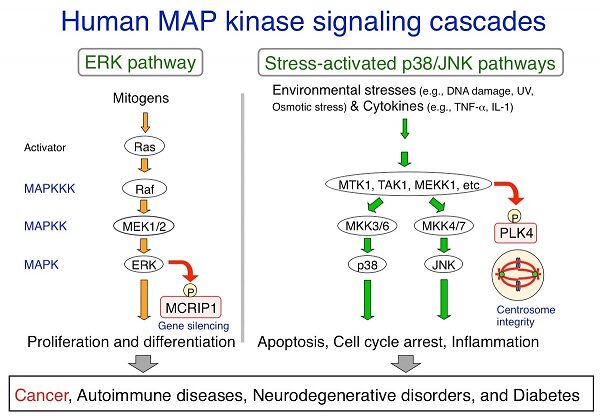"Regulation of cell-fate decisions by MAPK signaling pathways and its failure in cancer", Prof. Mutsuhiro Takekawa.

Date
Location
Description
Speaker: Prof. Mutsuhiro Takekawa
Division of Cell Signaling and Molecular Medicine, Institute of Medical Science, The University of Tokyo
Title: Regulation of cell-fate decisions by MAPK signaling pathways and its failure in cancer
Abstract: In eukaryotic cells, a wide array of extracellular stimuli generates intracellular signals that converge on a limited number of protein kinase cascades, commonly referred to as mitogen-activated protein kinase (MAPK) pathways. MAPK cascades (MAPKKK-MAPKK-MAPK) are the major signaling systems that dictate cell fate decisions such as, proliferation, differentiation, and apoptosis. There are at least three subfamilies of MAPKs, named p38, JNK, and ERK in human cells. The ERK subfamily members are activated by mitogenic stimuli and are associated with cell proliferation. In contrast, JNK and p38 are activated by environmental stresses (e.g., DNA damage or osmotic shock) and by cytokines (e.g., TNF), and play pivotal roles in cellular stress responses. Thus, p38 and JNK are collectively called "stress-activated MAPKs". Perturbation of these critical signaling systems is involved in a variety of life-threatening disorders, including cancer and auto-immune diseases. Therefore, these signaling systems are of clinical importance. We have recently identified several molecules that are regulated by MAPK signaling, including PLK4 and MCRIP1, and showed that some of these molecules were indeed aberrantly regulated in human cancer. In this seminar, I will review our resent findings concerning the regulation of MAPK signaling and its failure in cancer.
Host:
Tadashi Yamamoto, Cell Signal Unit
We look forward to seeing many of you there.
Sincerely,
Kaori Yamashiro
Cell Signal Unit (Yamamoto Unit)
Subscribe to the OIST Calendar: Right-click to download, then open in your calendar application.



